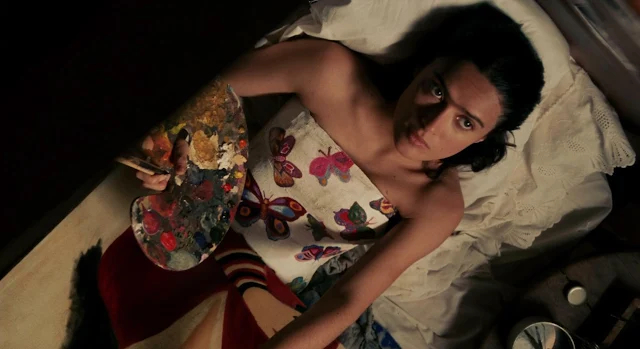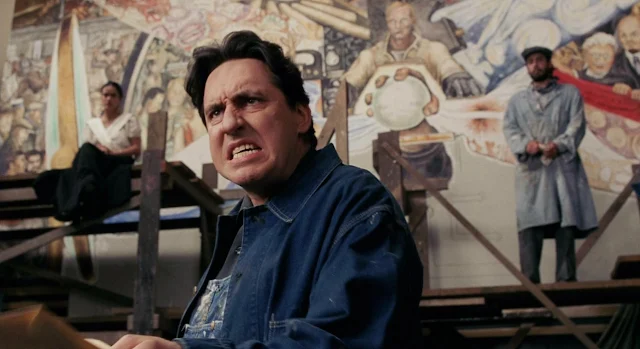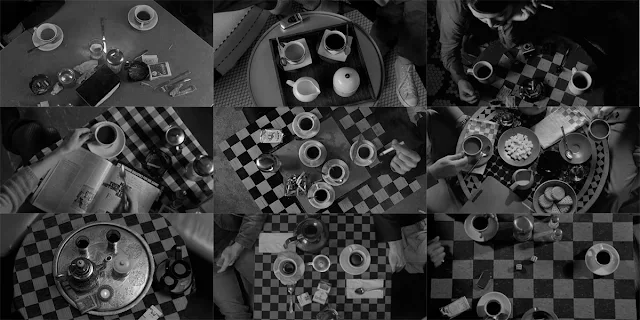A blog formerly known as Bookishness / By Charles Matthews
"Dazzled by so many and such marvelous inventions, the people of Macondo ... became indignant over the living images that the prosperous merchant Bruno Crespi projected in the theater with the lion-head ticket windows, for a character who had died and was buried in one film and for whose misfortune tears had been shed would reappear alive and transformed into an Arab in the next one. The audience, who had paid two cents apiece to share the difficulties of the actors, would not tolerate that outlandish fraud and they broke up the seats. The mayor, at the urging of Bruno Crespi, explained in a proclamation that the cinema was a machine of illusions that did not merit the emotional outbursts of the audience. With that discouraging explanation many ... decided not to return to the movies, considering that they already had too many troubles of their own to weep over the acted-out misfortunes of imaginary beings."--Gabriel García Márquez, One Hundred Years of Solitude
Search This Blog
Showing posts with label Alfred Molina. Show all posts
Showing posts with label Alfred Molina. Show all posts
Saturday, February 8, 2020
Rango (Gore Verbinski, 2011)
Cast: voices of Johnny Depp, Isla Fisher, Abigail Breslin, Ned Beatty, Alfred Molina, Bill Nighy, Stephen Root, Harry Dean Stanton, Timothy Olyphant, Ray Winstone. Screenplay: John Logan, Gore Verbinski, James Ward Byrkit. Cinematography: Roger Deakins. Production design: Mark "Crash" McCreery. Film editing: Craig Wood. Music: Hans Zimmer.
Rango's Oscar win for best animated feature is anomalous: The award typically goes to a product of the Disney/Pixar factory. And unlike the usual winners, the characters aren't the usual cuddly figures destined for the toy shelves, but a gnarly selection of lizards and rodents and other desert creatures, centered on Rango himself, a bulbous-eyed chameleon voiced brilliantly by Johnny Depp. Visually, then, Rango is aimed more at adult audiences than at the kiddies. On the other hand, its story is the usual excuse for harmless mayhem that is the stuff of most animated features. There is a good deal of wit in the film, much of it aimed at Western-movie clichés, but I found that on the whole it left me a little cold. There's something to be said for cuddliness after all.
Wednesday, October 30, 2019
Frida (Julie Taymor, 2002)

Frida (Julie Taymor, 2002)
Cast: Salma Hayek, Alfred Molina, Mia Maestro, Diego Luna, Valeria Golino, Roger Rees, Ashley Judd, Antonio Banderas, Edward Norton, Geoffrey Rush. Screenplay: Clancy Sigal, Diane Lake, Gregory Nava, Anna Thomas, based on a book by Hayden Herrera. Cinematography: Rodrigo Prieto. Production design: Felipe Fernández del Paso. Film editing: Françoise Bonnot. Music: Elliot Goldenthal.
I usually don't like biopics, with their lurches back and forth between trauma and triumph and their subordination of fact to drama. But I admired Julie Taymor's attempt to integrate Frida Kahlo's life with her work, or really to interpret the latter through the former. I think Taymor falls into the inevitable trap of spending more time on her subject's love life than on her actual work, but Salma Hayek and Alfred Molina are so skillful in displaying the passion and volatility of the film's versions of Frida and Diego Rivera that I can forgive the emphasis on that relationship. Taymor and the screenwriters are less successful in integrating the political aspect of their lives, with its culmination in Frida's affair with Trotsky, played a little remotely by Geoffrey Rush. But the film thrives on its visuals, integrating Frida's paintings with her life, and by the evocative use of color to denote the emotional states of its subject. The trolley accident that marked Frida's life is superbly staged and edited, followed by a brilliant use of Day of the Dead images to suggest Frida's delirium as she undergoes treatment. Frida's greatest success is that it will be hard for me to look at her paintings again without summoning up memories of the film.
Monday, July 3, 2017
Dead Man (Jim Jarmusch, 1995)
 |
| Johnny Depp in Dead Man |
Nobody: Gary Farmer
Cole Wilson: Lance Henriksen
Conway Twill: Michael Wincott
Johnny "The Kid" Pickett: Eugene Byrd
John Scholfield: John Hurt
John Dickinson: Robert Mitchum
Salvatore "Sally" Jenko: Iggy Pop
Benmont Tench: Jared Harris
Big George Drakoulios: Billy Bob Thornton
Thel Russell: Mili Avital
Charlie Dickinson: Gabriel Byrne
Train Fireman: Crispin Glover
Trading Post Missionary: Alfred Molina
Director: Jim Jarmusch
Screenplay: Jim Jarmusch
Cinematography: Robby Müller
Production design: Bob Ziembicki
Music: Neil Young
It was probably inevitable that Jim Jarmusch and Johnny Depp, two of American film's best-known off-beat artists, would collaborate, and it seems appropriate that they should do it in that quintessentially off-beat American genre, the "stoner Western."* Unfortunately, for some viewers the film just feels stoned: slow, meandering, and fixated on images that refuse to yield up their significance. It is, I think, one of those films that are more involving to think about after watching them, which is why its reputation has grown since its initial release, when Roger Ebert, among other critics, dismissed it as "unrewarding." It opens with a long montage of young accountant William Blake's westward train journey from Cleveland to the end-of-the-line factory town called Machine, a name that suggests the real manifest destiny of the United States was the spread of industrial capitalism. Blake is on his way to a job with the Dickinson Metalworks in Machine, and is unaware that he shares a name with the poet and artist who was one of the great enemies of industrial capitalism. He dozes through spectacular scenery that has filled the great Westerns -- a reminder that before there were movies there were train windows. But when he arrives in Machine, no job is waiting for him, and his protests are futile when he demands to see Mr. Dickinson, who turns out to be the always-formidable Robert Mitchum in his last screen role. Moreover, that night he kills Dickinson's son in self-defense and, wounded himself, flees town on a stolen horse. Dickinson immediately hires a trio of gunmen to kill him. Blake is found half-dead from his wound by an Indian, who patches him up but also tells him that the bullet is lodged near his heart and he will die from it eventually. The Indian is called Nobody because he belongs to no tribe, having been abducted by white men as a child and taken to England to be exhibited. He was educated there and learned to love the art and poetry of William Blake, so naturally he proclaims the hapless accountant a reincarnation of the poet. And so Blake and Nobody begin an odyssey toward the Pacific, a picaresque in which Jarmusch manages to cross an adventure story with a satiric look at the failure of American ideals, using bits of Blake's prophetic verse as a running commentary. (Remarkably, quotations from Blake turn out to sound much like the kind of native wisdom usually ascribed to American Indians in the movies.) It's to Jarmusch's credit that this high-concept blend becomes as moving as it often is, especially, as I've suggested, in retrospect.
*Jarmusch referred to Dead Man as a "psychedelic Western," but aside from the scene in which Nobody, under the influence of peyote, sees the skull beneath William Blake's skin, it doesn't have the conventional distortions and hallucinations associated with movie psychedelia.
Watched on The Movie Channel
Tuesday, June 27, 2017
Coffee and Cigarettes (Jim Jarmusch, 2003)
Cast: Roberto Benigni, Steven Wright, Joie Lee, Cinqué Lee, Steve Buscemi, Iggy Pop, Tom Waits, Joseph Rigano, Vinny Vella, Vinny Vella Jr., Renee French, E.J. Rodriguez, Alex Descas, Isaach De Bankolé, Cate Blanchett, Michael Hogan, Jack White, Meg White, Alfred Molina, Steve Coogan, Katy Hansz, The GZA, RZA, Bill Murray, William Rice, Taylor Mead
Director: Jim Jarmusch
Screenplay: Jim Jarmusch
Cinematography: Tom DiCillo, Frederick Elmes, Ellen Kuras, Robby Müller
Production design: Dan Bishop, Mark Friedberg, Tom Jarmusch
For Jarmusch fans only. Coffee and Cigarettes, a collection of 11 black-and-white short films in which people sit at tables and drink coffee and smoke cigarettes, began as semi-improvisatory shorts spun off from Jarmusch's features by their crew and cast members and friends. Starting with Roberto Benigni and Steven Wright essentially winging it in "Strange to Meet You," the collection evolved from a series of shaggy-dog sketches into more structured narratives with a few motifs echoing throughout. The most structured is certainly "Cousins," in which Cate Blanchett plays two roles: the soigné movie star Cate and her blowsier cousin Shelly, who resents Cate's privileged life. They meet in the coffee shop of a luxury hotel, where Cate patiently endures Shelly's sniping until she's called away for an interview. Shelly has been smoking throughout their conversation, but when she lights up after Cate leaves, a waiter tells her that smoking is forbidden there. The episode "Cousins?" is a parallel story in which Alfred Molina and Steve Coogan, two British actors trying to make it in the States, meet for coffee, during which Molina reveals to a very unimpressed Coogan that he has done genealogical research which proves they are distant relations. After an excited fan asks for his autograph, Coogan becomes more and more condescending toward Molina. Then Molina receives a call on his cell phone from Spike Jonze, instantly deflating Coogan's ego to the point that Molina leaves him to pay the check. Amusing as these vignettes are, they don't rise much beyond the level of anecdotes, and some of the other episodes, such as the ones in which Jack White demonstrates his Tesla coil or Renee French fends off a too-attentive waiter, fall flat. Still, if you don't expect too much, there's an evanescent charm to the whole project.
Watched on Showtime
Subscribe to:
Comments (Atom)






















